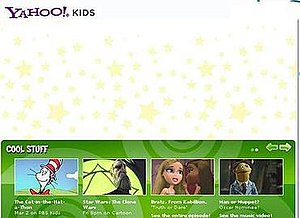An Internet filter is software that restricts or controls the content an Internet user is capable to access, especially when utilized to restrict material delivered over the Internet via the Web, Email, or other means. Such restrictions can be applied at various levels: a government can attempt to apply them nationwide, or they can, for example, be applied by an Internet service provider to its clients, by an employer to its personnel, by a school to its students, by a library to its visitors, by a parent to a child's computer, or by an individual user to their own computers. The motive is often to prevent access to content which the computer's owner(s) or other authorities may consider objectionable. When imposed without the consent of the user, content control can be characterised as a form of internet censorship. Some filter software includes time control functions that empowers parents to set the amount of time that child may spend accessing the Internet or playing games or other computer activities.
Meta elements are tags used in HTML and XHTML documents to provide structured metadata about a Web page. They are part of a web page's head section. Multiple Meta elements with different attributes can be used on the same page. Meta elements can be used to specify page description, keywords and any other metadata not provided through the other head elements and attributes.
Spamdexing is the deliberate manipulation of search engine indexes. It involves a number of methods, such as link building and repeating related and/or unrelated phrases, to manipulate the relevance or prominence of resources indexed in a manner inconsistent with the purpose of the indexing system.

robots.txt is the filename used for implementing the Robots Exclusion Protocol, a standard used by websites to indicate to visiting web crawlers and other web robots which portions of the website they are allowed to visit.
Search engine optimization (SEO) is the process of improving the quality and quantity of website traffic to a website or a web page from search engines. SEO targets unpaid traffic rather than direct traffic or paid traffic. Unpaid traffic may originate from different kinds of searches, including image search, video search, academic search, news search, and industry-specific vertical search engines.
Yahoo! Groups was a free-to-use system of electronic mailing lists offered by Yahoo!.

A metasearch engine is an online information retrieval tool that uses the data of a web search engine to produce its own results. Metasearch engines take input from a user and immediately query search engines for results. Sufficient data is gathered, ranked, and presented to the users.

Yahoo! Japan is a Japanese web portal. It was the most-visited website in Japan, nearing monopolistic status.
Internet privacy involves the right or mandate of personal privacy concerning the storage, re-purposing, provision to third parties, and display of information pertaining to oneself via the Internet. Internet privacy is a subset of data privacy. Privacy concerns have been articulated from the beginnings of large-scale computer sharing and especially relate to mass surveillance.

A search engine is a software system that provides hyperlinks to web pages and other relevant information on the Web in response to a user's query. The user inputs a query within a web browser or a mobile app, and the search results are often a list of hyperlinks, accompanied by textual summaries and images. Users also have the option of limiting the search to a specific type of results, such as images, videos, or news.

Microsoft Bing, commonly referred to as Bing, is a search engine owned and operated by Microsoft. The service traces its roots back to Microsoft's earlier search engines, including MSN Search, Windows Live Search, and Live Search. Bing offers a broad spectrum of search services, encompassing web, video, image, and map search products, all developed using ASP.NET.

Naver is a South Korean online platform operated by the Naver Corporation. The Naver provides community services including blogs and cafes, other convenient services such as knowledge shopping, maps, books, e-mail and naver tool bar.
Google and its subsidiary companies, such as YouTube, have removed or omitted information from its services in order to comply with company policies, legal demands, and government censorship laws.

In geomarketing and internet marketing, geotargeting is the method of delivering different content to visitors based on their geolocation. This includes country, region/state, city, metro code/zip code, organization, IP address, ISP, or other criteria. A common usage of geotargeting is found in online advertising, as well as internet television with sites such as iPlayer and Hulu. In these circumstances, content is often restricted to users geolocated in specific countries; this approach serves as a means of implementing digital rights management. Use of proxy servers and virtual private networks may give a false location.

Whyville is an educational Internet site geared towards children aged 8–14, founded and managed by Numedeon Inc. Whyville engages its uses in learning about a broad range of topics, including science, business, art and geography. Whyville's users (Whyvillians) engage in virtual world simulation based games and role play sponsored by a wide range of governmental, non-profit, and corporate entities. In 2009, the website had a registered base of more than 7 million users.
KidZui was a web browser designed for children developed by KidZui, Inc. The KidZui browser used a Zooming User Interface paradigm to make browsing easier for children. Search results appeared as scaled-down images of websites, videos, and pictures that children click on to zoom in and see the content. Children can also browse by category without typing search terms. The KidZui browser did not access the open Internet. KidZui uses teachers and parents to screen content and maintains a database of approved URLs. The KidZui browser could only access URLs in the approved database. Children built avatars called Zuis to represent themselves online. They earned points for web browsing and used points to gain levels and buy clothes and accessories for their Zuis. Children could share KidZui content with friends online. To add a friend online, children needed to know the friends Zui name. There was no online directory of Zui names, so children needed to get their friends Zui names offline in order to add them. Friends also needed to be approved by parents before they become available in the browser. KidZui also tracked children's Internet usage and sends reports to their parents on what their children looked at online.
KidRex.org is a visual child-safe search engine powered by Google Programmable Search Engine. The website utilizes Google SafeSearch and maintains its own database of inappropriate websites and keywords. Additionally, social media websites are blocked by KidRex. Kidrex Pro is a premium version of the website with more features. Kidrex Pro Is currently being re-imagined into a brand new service.

Kiddle.co is a web search engine and online encyclopedia emphasizing safety for children. Kiddle search is powered by Google Programmable Search Engine and employs SafeSearch with additional filters. Kiddle is powered by Google Custom Search but is not affiliated with Google LLC. It has been mistaken for a Google product in several news articles and blogs due to its name.










